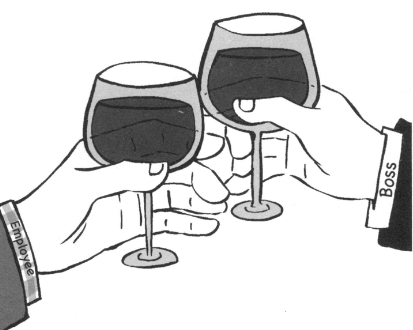In Europe and North America, people typically toast once at the beginning of a meal, and maybe once in the middle if someone wants to make a speech. But in China, people toast throughout the meal and do so in a very specific way.
At the start of a meal, everyone joins in for a group toast. Afterwards, during the meal, various people will make individual toasts with specific people; the highest-ranking people will toast each other, the junior staff will toast their superiors, the host will toast the guest of honor, and so forth. Some toasts are for the whole table, but many toasts are just one-on-one.
The amount people drink for each toast will also vary, with some toasts finished with a small sip and others requiring the participants to empty their glasses (called ganbei). Generally speaking, emptying one's own glass is a sign of respect and sincerity toward one's drinking partner. A person with a higher social rank should drink less than someone with a lower rank. For example, when a junior staff drinks with a senior person, the junior staff will usually empty his/her glass, while the senior person will take just a sip. Senior people drinking together can either sip or ganbei, while the host will usually have at least one ganbei with the guest of honor to show sincerity and strong friendship. Similarly, junior members of two different departments or companies will ganbei when toasting each other to cement their relationship.
The toasting phrase is also different depending on whether you empty the glass or just take a sip. If you want to ask your partner to finish the glass, you say "ganbei" for "bottom's up." Once you have downed the drink, you tip the glass over to show that there is nothing left. If you want to do a mild toast where everyone can just take a sip, then you say "suiyi" which means "as you like."

You also need to know how to clink your glass. One of Bryan's helpful Chinese joint venture partners taught us this etiquette. When you toast someone who is more senior in position, then you want to lower your glass so that when the glasses meet yours is at a slightly lower position than his. If you are toasting someone who is your equal, then you clink your glasses at the same level. If your subordinates are toasting you, then your glass should remain a little higher than his.
Sometimes, to pay extra respect, the Chinese will intentionally lower his glass in relation to yours even if he is your equal. In that case, you have to lower yours to match his. That often disintegrates into a competition to the extent that both glasses hit the table and reach a point where they will go no lower. When individuals are toasting as a big group around a big table, everyone will tap his glass on the round glass in the middle of the table as a substitute for physically clinking the glasses.
(selected from 101 Stories for Foreigners to Understand Chinese People by Yi S. Ellis and Bryan D. Ellis, published by China Intercontinental Press in 2012)

